By Anna Katherine Clemmons
ESPN The Magazine
Ryan Zimmerman walks into an Arlington, Va., restaurant on a cold December afternoon. Dressed in jeans, a checkered button-down shirt and brown loafers, the 6-foot-3 North Carolina native looks like one of the many young professionals who populate the Washington suburb.
“Don’t I know you from somewhere?” the host asks after greeting him, pondering Zimmerman’s face for several seconds. “You look so familiar. College, maybe?”
“No, I don’t think so,” Zimmerman says, shaking his head and shrugging his shoulders.
“OK. I’ll think of it,” the host says as he leads the Nationals’ All-Star third baseman to his table.
A few minutes later, he returns with menus. “I think I’ve got it,” the host says. “You know Whitlow’s [a nearby bar and restaurant]? Do you go there? I bet that’s it — I used to work there.”
Zimmerman pauses for a moment. He could tell the host the truth — that this past year he won the Gold Glove, Silver Slugger, Fielding Bible and “Baseball Tonight” Web Gem awards and held major league baseball’s longest hitting streak (30 games) while being voted to his first-ever All-Star Game. Or, that since his arrival in Washington in September 2005, the 25-year-old third baseman has become one of the best players in baseball and the face of the franchise for the Nationals.
Chances are a New York City host wouldn’t confuse Alex Rodriguez or David Wright with a college classmate. But this is Washington, D.C., and Zimmerman is the reserved, easygoing star of 2009’s worst team in baseball.
“People in D.C. have a lot of other things going on,” Zimmerman said in explaining why the Nats’ fan base is sometimes criticized as less devoted than those of other major cities. “And when you win in this city, it’s different.”
The Nationals haven’t had a winning season since his arrival. Yet Zimmerman showed his commitment to Washington last spring when he signed a five-year, $45 million deal through 2013.
“Few players stay in the same place their whole career,” Zimmerman said. “It’d be a really cool accomplishment to have been here at our worst and see us through to our best. Hopefully, I can be that guy who’s been here from the beginning and helped turn it all around.”
Zimmerman’s parents, Keith and Cheryl, moved their two sons (Ryan has a younger brother, Shawn) to Virginia Beach, Va., when Ryan was in the sixth grade. Though they didn’t realize it, the family ended up in a baseball hotbed. Zimmerman’s AAU league included the future major leaguers Mark Reynolds, B.J. and Justin Upton, and David Wright.
Zimmerman was much smaller in his teenage years, a self-described “late bloomer,” and his September birthday meant he was younger than most of his classmates. Still, his talent was evident.
“I think we saw even from the early stages of Little League, he was a year or two above everyone he was playing with,” Keith says. “He’d step on the field and literally change the outcome of the game.”
Competing against future major league players also didn’t hurt. “He could just always play and hit,” B.J. Upton said of Zimmerman. “He’s also a great teammate, and I think that’s a key factor that people forget. For him, it’s more than his play on the field. He’s a guy who can be a leader and that makes things so much easier in the clubhouse.”
Zimmerman wasn’t drafted out of Kellam High School. He graduated 23rd out of 300 in his class and went to the University of Virginia on a baseball scholarship. Reynolds, a shortstop, was a year ahead of Zimmerman. The two battled as high school rivals but played together for two years at Virginia and remain close friends.
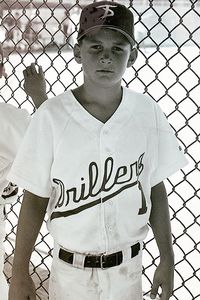
Courtesy of Cheryl Zimmerman - Even as a "late bloomer," Ryan Zimmerman's baseball skills began surfacing as a young player in Virginia Beach, Va.
“He was always an unbelievable fielder,” Reynolds said. Zimmerman assumed his years at UVa would lead to a great education (he was a sociology major), not a sporting future. “I didn’t really think I had a chance at being a pro,” Zimmerman says.
UVa head coach Brian O’Connor thought otherwise. “It was a pretty spectacular thing to watch him,” O’Connor says. “What also stuck out was his baseball knowledge, his understanding of the game. He was very confident and yet also very humble, which is rare in a player.”
Zimmerman’s humility also stemmed from his life at home. Cheryl was diagnosed with multiple sclerosis when Zimmerman was in high school and since 1995 has been in a wheelchair. “She hasn’t been able to do a lot of the mom stuff, and I think that’s helped him be as mature and responsible as he is,” Reynolds says. “He’s almost wise beyond his years.”
Ryan and Shawn learned to do their own laundry, cook meals, work as handymen and repairmen, and transport themselves to and from practices. Zimmerman downplays the responsibilities, saying only that he learned from his mother how to take things in stride.
In 2006, Zimmerman began his ZiMS Foundation, raising funds and awareness in the fight to stop MS, which affects as many as 2.5 million people worldwide. His parents are on the board of directors, and the family hosts various events throughout the year in supporting the cause.
Zimmerman was called up to the major leagues by the Nationals in September 2005 after playing less than four months in Class A and Double-A and celebrated his 21st birthday later that month. Washington had selected him in the first round of the draft as the fourth overall pick that June, giving him a $3 million signing bonus.
Zimmerman hit .397 in the final 20 games of the ’05 season, sharing time with the veteran third baseman Vinny Castilla. When Castilla was traded to the Padres in the offseason, Zimmerman solidified his spot as the Nats’ starting third baseman heading into spring training.
Many sportswriters and Jim Bowden, the Nats’ general manager at the time, dubbed Zimm, as he’s known to friends and fans, the “face of the franchise” entering the 2006 season. For the reserved yet confident Zimmerman, the tag was a mixed blessing.
“The hardest thing for me was they wanted me to be that [face of the franchise] from day one,” Zimmerman says. “People don’t realize that I’m only 25 now.”
When the Nationals drafted No. 1 overall pick Stephen Strasburg in June, many wondered whether the “face of the franchise” tag would be passed on to the young pitcher. Zimmerman met Strasburg and spent some time with him this summer. “It seems like he understands things and has a good grip,” Zimmerman says. “There’s lots of pressure on him, which is unfair; one person can’t change a team.”
“
He’s the kind of guy you can build a franchise around, which the organization has done, and that’s the ultimate compliment.
” — Mets third baseman David Wright on Ryan Zimmerman
And yet, in many ways, that’s what Zimmerman has tried to do. He led the Nationals in almost every offensive category in 2009: at-bats (610), runs (110), hits (178), doubles (37), RBIs (106) and total bases (320 — he was the only Nats player to surpass 300). His .292 batting average trailed only Nyjer Morgan‘s .307 among team members with at least 100 at-bats.
Defensively, Zimmerman led all National League third basemen in assists, total chances, total outs recorded and games started. His 110 runs were second-best among league third basemen, and his 33 homers tied with Evan Longoria for second. His 320 total bases led all third basemen.
“He’s just an all-around great player,” said Washington Redskins tight end Chris Cooley, a good friend of Zimmerman’s. “He can hit bombs, but he also gets a lot of base hits. He plays smart, hardly makes any errors. He’s the exact type of guy that you’d want for your team.”
Especially a team that has continued to struggle. Washington’s overall record last year was baseball’s worst: 59-103. The Nationals finished tied for ninth among the 16 NL teams in batting average last year (.258). Their fielding percentage, however, was dead last at .977, and their 143 errors were also the most in the NL. Their pitching fared no better, compiling an NL-worst 5.00 ERA. Their 911 strikeouts were also the fewest among all NL teams.
Zimmerman’s role as a clubhouse leader has developed gradually. He points to the style modeled by Derek Jeter, the perennial Yankees All-Star whose talent speaks for himself and whose role isn’t overstated.
“Ryan was not a really vocal player,” O’Connor said. “He won’t go out and be the rah-rah guy, but he leads by what he brings to the field every day. His 100 percent consistent effort and attention to detail really was his leadership.”
Zimmerman’s evolution in Washington has also motivated the changing faces around him. When veteran Nick Johnson was traded away in August, Zimmerman admits that it wasn’t easy losing an established veteran. But he points to trades like the July acquisition of Morgan as a smart long-term move for the team.
“He’s always been one of those guys who’ll look at the big picture, whether we’re talking about what management group to use or what college to go to,” father Keith said. “When he looks at the Nationals, they have a brand-new stadium, they’re in a big-money market, and I think he sees the opportunity down the road. He’s a patient enough guy to wait for it.”
FIRST AT THIRD?
Check out where Ryan Zimmerman, who won his first Gold Glove in 2009, ranked among all third basemen according to two different defensive metrics — Ultimate Zone Rating (courtesy of FanGraphs) and Fielding Bible Plus/Minus (courtesy of Bill James Online):
UZR
| PLAYER | STAT |
|---|---|
| Evan Longoria | 18.5 |
| Ryan Zimmerman | 18.1 |
| Chone Figgins | 16.7 |
| Adrian Beltre | 14.3 |
| Brandon Inge | 9.4 |
Plus/Minus
| PLAYER | STAT |
|---|---|
| Chone Figgins | +40 |
| Ryan Zimmerman | +28 |
| Adrian Beltre | +27 |
| Scott Rolen | +22 |
| Evan Longoria | +21 |
That even-keel persona is indicative of his personality both on and off the field. “We grew up at the beach surfing, and we always had that laid-back lifestyle,” Reynolds said. “He can have an 0-for-15 slump and he’ll snap out of it. I’ve never really seen him mad or fired up about anything.”
“He doesn’t let the highs or lows take over,” Nationals hitting coach Rick Eckstein said. “In those pressure-packed moments, he can step outside and analyze the situation for what it is.”
Eckstein points to a moment last spring during Zimmerman’s hitting streak. Zimmerman had yet to record a hit as the game reached the final innings. He stepped up to the plate and worked the count before “he smokes the ball into right center, and our whole dugout erupted because he kept the streak alive,” Eckstein said. “He had this big smile over his face. Everyone was pulling for him during that time.”
ESPN and other national broadcasts interrupted regular programming and switched over to his at-bats during the streak. Upton says he followed the streak through stats and Web updates. Zimmerman says he never felt added pressure and still treated each game like any other. “You should feel like you’re the best player out there, and you should tell yourself you are,” Zimmerman said. “You should be the guy everyone thinks will get the game-winning hit.”
Zimmerman says that baseball is full of “overthinkers.” He chooses to avoid the cerebral jinx. “You have to have a plan, and the longer you’re in the bigs, the easier it gets. Pitchers will set you up — they’re creatures of habit. If I’m facing [John] Smoltz, I’ll look at film and see what he’s done before. If I’m ahead and then [the pitcher] got me out throwing off-speed pitches, then I’ll look for what he got me out on.”
He also acknowledges that every plan can’t be executed perfectly and that that’s part of baseball’s parity. “It’s such a cat-and-mouse game — if you’re a hair late or early, your whole plan is out the window. You can have everything set up perfectly, but it’s still so hard if you miss your pitch. Think about it — three out of 10 is horrible in any other sport, but it’s great in baseball. You’re gonna be crappy sometimes, but you have to learn to get better from failing.”
The Nationals’ strength and conditioning coach, John Philbin, trains Zimmerman at his gym throughout much of the offseason. “I wish every player were like Ryan,” Philbin said as he ran Zimmerman through a morning of intense upper-body workouts mixed with sprints and interval running. Zimmerman says that before Philbin’s arrival, he had some “baby fat” to work off. But at 6-3, 220 pounds, he’s in arguably the best shape of his life. In the offseason, he works out every weekday but gives himself the weekends off.
In January, he’ll travel to Tampa, Fla., to work out with a group of fellow major leaguers. He’ll stay through the start of spring training in Viera, Fla., and won’t return to Washington until April.
After his rookie year, Zimmerman bought a three-bedroom townhouse in Arlington. The 3,000-square-foot house is three stories tall but not flashy — the only extravagancies are a two-car garage and a small movie-theater room. Zimmerman is a self-professed movie nut (his collection hovers around 300 DVDs) and a Best Buy addict. “I joined that [Best Buy] Rewards card program and thought I wouldn’t really use it much,” Zimmerman says. “Then a month later, they’re sending me all these $25 gift cards because I’m shopping there so often.” Framed movie posters decorate the walls of the theater room, including signed posters from Vince Vaughn and Will Ferrell.
Three years into his Arlington digs, he still hasn’t finished decorating. Framed photos sit on the floor of his office. His uncle visited last spring to assemble a wall of photos and a shelf of signed baseballs, which Zimmerman collected earlier in his major league tenure. His French bulldog, Miley, also has free reign around the house.
“He hangs around with the right kind of people,” Reynolds says. “It’s pretty tough to be that close to him, but I got an early start. His support group is a really good one.”
Zimmerman is single and says that as he is recognized more often, dating is sometimes a challenge. “I’m not complaining about too many girls because I wouldn’t complain about that, but it’s different — you have to watch yourself,” Zimmerman said. He and his friends sometimes make up an alternative profession when they’re out in bars, saying Zimmerman is a golf-course designer. His dry sense of humor is seen most often by those who are close to him.
Even when he hangs out with his teammates, they rarely talk about baseball. Adam Dunn joined the Nationals last spring, and although he’s almost five years older than Zimmerman, the two have become good friends. “When we go out, it’s zero talk about baseball,” Dunn says. “We don’t want to go home and talk about our job. Once we leave the field, we’re done with it.”
“People assume that’s all you want to talk about,” Zimmerman says. “But when I’m with my closest friends, that’s usually the last thing we talk about.”
Zimmerman has never ridden the Metro, Washington’s subway system, and says that at this point, it’s a source of pride to see how long he can go before riding. He’s also never visited the Smithsonian museums, a goal for this past offseason that now will have to wait until next year. That’s not to say he doesn’t enjoy the spoils of living in the nation’s capital. Zimmerman has toured Air Force One and the CIA’s training facilities and has even participated in simulations undergone by the nation’s secret service.
In 2007, he mentioned in a Sports Illustrated article that he’d like to meet the president. A few days later, the Nationals received a note from President Bush: “Tell Ryan I’m right down the street and he’s welcome for lunch anytime.” A lunch date was set a few weeks later, and Zimmerman brought teammates Austin Kearns and Nick Johnson. He has a framed photo of that day hanging in his office along with a signed note from the former president.
But even having a fan in the White House (though the current president is a well-known White Sox fan) doesn’t necessarily fill seats. The Nationals’ average attendance in 2009 was 22,716 fans, placing them 24th out of the 30 MLB teams. (Oakland was the league’s worst, at 17,392.) But that’s a large drop from 2008, the first year in their new $611 million ballpark, when the Nats averaged 29,005 fans per game.
“When it comes down to it, if you want fans there, you have to win,” Zimmerman says. When fans recognize him away from Nationals Park, they often want to talk about the stats he’s earning in fantasy baseball or when he thinks Teddy will finally win the popular President’s Race held at the park each game.
Zimmerman appears at various community events but shies away from too much attention. “I’m really boring with the media here on purpose,” he says. He also confesses that while he used to fear public appearances, now he doesn’t mind them, especially if they involve working with children.
Ryan Zimmerman
#11 Third Baseman
Washington Nationals
2009 STATS
- GM157
- HR33
- RBI106
- R110
- OBP.364
- AVG.292
When he’s not playing baseball or with his friends, Zimmerman enjoys watching the NFL. Cheryl is a Steelers fan, but Ryan cheers for the Redskins as a result of the friendships he’s formed with Cooley, quarterback Jason Campbell and several other Redskins players. He also plays fantasy football with his Nats teammates, which he says is a nice way to stay connected in the offseason. He lives fairly modestly; when asked how he’d spend his signing bonus in 2005, the then-20-year-old said he’d probably buy a Slurpee machine. (He hasn’t purchased one yet but says it may still happen.)
“He’s the kind of guy you can build a franchise around, which the organization has done, and that’s the ultimate compliment,” Wright said. The two players’ lockers were next to each other at the All-Star Game this summer, with Justin’s a few stalls down, which Wright says was a really special moment for the Virginia products. “We’re not rivals exactly, but we push each other because we want to outdo each other,” Wright said. “We’re almost baseball brothers in that sense.”
Though it was an impressive year of personal accolades, Zimmerman says he still feels he has work to do. “This year, I had a 10 or so game stretch where I’d botch a throw on an easy play,” Zimmerman says. “My goal defensively is to get rid of that.”
“He is, in my estimation, a complete player who pushes himself every single day,” Eckstein said. “He definitely has that level of never being satisfied, and that’s one of the greatest attributes a player can possess.”
His larger goal, of course, is still having a winning season and making the playoffs. “He’s been on a team before where they get to a point and struggle and it takes a while for them to make it,” Cheryl says. “I think he likes the challenge.”
With the offseason addition of veteran Pudge Rodriguez behind the plate, as well as high-profile younger players like Strasburg in the system, that turnaround might happen as soon as this upcoming season. “He talks about how he loves it here and this is the place he wants to be,” Cooley says. “When you’re playing for the team you want to play for, that’s awesome.”
A slight smile spreads across Zimmerman’s face as he looks back up at the restaurant host, his question still hanging in the balance. “Yeah, that must be it,” Zimmerman said of the Whitlow’s reference.
The host walks away, satisfied, and Zimmerman is content to keep his incognito status.
Because in a few years — maybe even as soon as next season — that will change. One of baseball’s best players can stay hidden for only so long.
Anna Katherine Clemmons is a reporter for ESPN The Magazine.
Article taken from: ESPN the Magazine



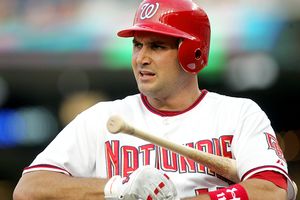
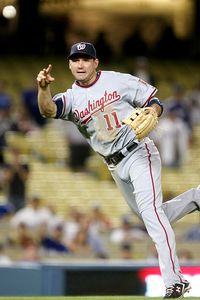


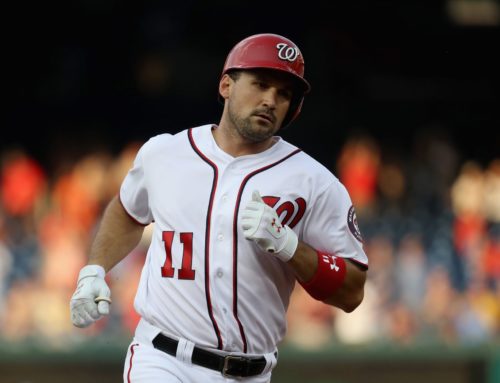
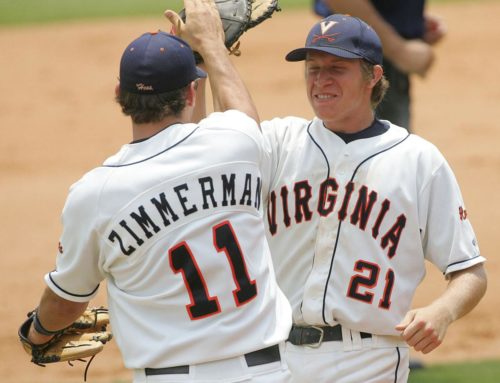
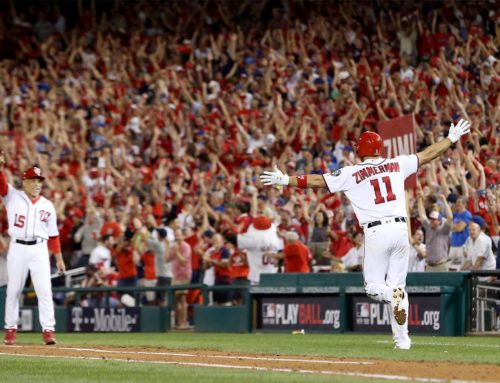
Leave A Comment